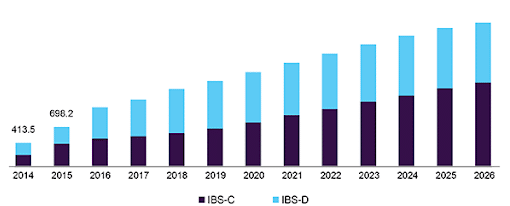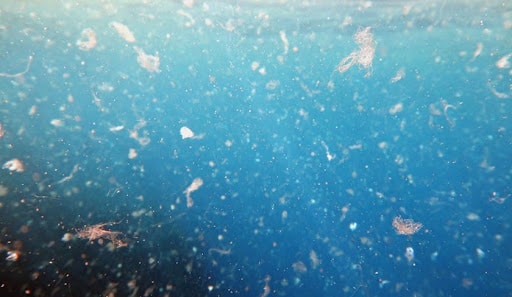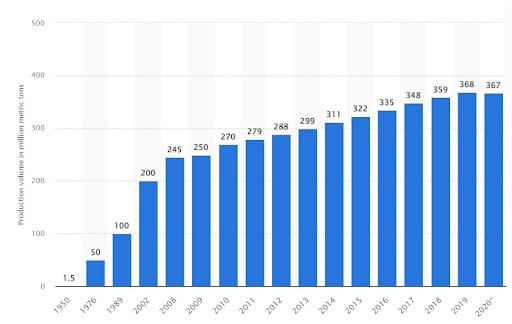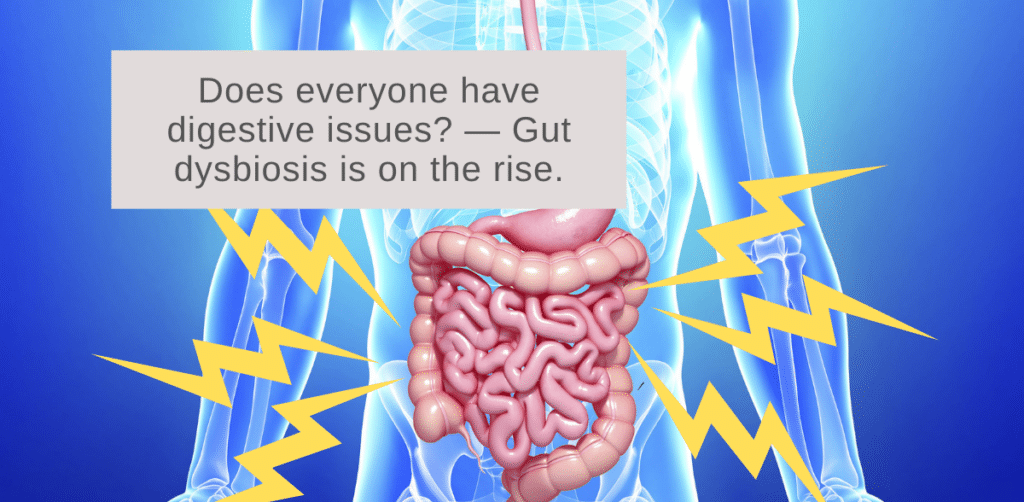Summary
Does it seem like everyone you know complains of digestive problems? That there are products everywhere targeting IBS-like symptoms, helping ease ‘bloating’, ‘digestive pain’, and ‘promoting a healthy gut?’ This might not be the Baader-Meinhof phenomenon. A startling number of people report having a disorder that affects their digestive tract (such as Irritable Bowel Syndrome (IBS) or Inflammatory Bowel Disease (IBD)). In this article we will discuss the rise in gut dysbiosis, and some of the emerging risk factors such as microplastics, increased consumption of supplements, and pandemic-related chronic stress.
The IBS Network reports that 1 in 3 people in the UK suffer from Irritable Bowel Syndrome (IBS), and about 10-15% of people worldwide (IBS Network, 2017). It is also an extremely impactful syndrome, with almost three-quarters (70%) saying IBS is a “debilitating” medical condition that, on average, causes them to take 9 days a year off work due to their symptoms. Taken together with the other, commonly occurring gut disorders such as Chron’s, Celiac Disease, and Ulcerative Colitis, people’s gastrointestinal issues are causing significant personal and societal strain.

Figure 1. USA IBS treatment market size, by type, 2014-2026 in millions (Grand View Research, 2019).
Treatments targeting IBS symptoms alone are estimated to increase 10.1% in the coming years, and while the exact cause of IBS is unknown, it has become known as the ‘catch-all’ digestive disorder, the diagnosis given when the others with similar symptoms (Chron’s, Celiac Disease, and Ulcerative Colitis) are ruled out (Grand View Research, 2019). This being said, many products are being marketed to the general public that claim to ‘support relief for IBS-symptoms’. But why are so many people suffering from an unhappy gut?
Microplastics

Figure 2. Microplastics in seawater and, sometime later, your body (Tunatura / Shutterstock).
What are microplastics?: The term ‘microplastic’ refers to the tiny pieces of plastic particles (<5mm) that are produced as plastic breaks down. Since plastic doesn’t biodegrade, all of the plastic ever produced worldwide is turning into these particles. And, they are being found everywhere – causing National Geographic to declare that “microplastics have moved into virtually every crevice on Earth” (NG, 2020). Immersed in the environment then, microplastics are making their way into our food – farm animals and fish mistake them for food and swallow them. Microplastics can even be found in fruit and vegetables, a recent study found between 52,050 and 233,000 particles/g depending on the sample (Conti et al., 2020).
What does this have to do with the inside of your gut? It turns out, a lot. A new study by Rubin & Zucker (2022) found that the presence of microplastics in the human body interacts with organic pollution, exacerbating toxicity by approximately 10x. Dr Zucker explained that, “the microplastic may reach the digestive tract through the ingestion of contaminated food and water where it releases the toxins in close proximity to the cells of the digestive tract, thus increasing the toxicity of these substances” (Tel-Aviv University, 2022).
Similarly, Yan et al., (2022) has found that the concentration of microplastics is significantly higher in the feces of patients who suffer from inflammatory bowel disease (IBD) than healthy individuals. This positive correlation led the study’s authors to postulate that the ingestion of microplastics may damage or deteriorate the gastrointestinal system, further causing inflammation and aiding in the disease’s manifestation.
 Figure 3. Annual production of plastics worldwide from 1950 to 2020
Figure 3. Annual production of plastics worldwide from 1950 to 2020
in million metric tons (Statista, 2022).
These recent studies are particularly concerning because globally, plastic production has been steadily increasing, and the majority of it is a result of the food industry. In 2016, 335 million metric tons of plastics were produced, of which 60% supplied the food and beverage industry for food packaging (Statista, 2022; Groh et al., 2019).
Increased consumption of supplements
CBD: Like products marketed towards gut health, the CBD industry has skyrocketed in recent years, despite there being very few studies conducted on these supplements. One of the more popular CBD products on the market is the gummies, which some gastrointestinal researchers have particularly warned against, noting that gummies get absorbed through the digestive tract, and include other ingredients such as sugars and food coloring which may disrupt a sensitive gut. Dr Korturbash, a researcher at the University of Arkansas for Medical Sciences (UAMS), has a stronger warning: “Cannabidiol significantly affects the gut microbiome, which in turn may affect the mucosa. In low doses, it may potentially improve gut health as a probiotic, but in high doses it can cause leaky gut syndrome” (Robinson, 2020). His team observed pro-inflammatory responses to CBD in the colon, as well as significantly decreased expression of Muc2-a gene intimately associated with gut integrity.
Melatonin: Melatonin has become a commonplace supplement, used by college students and retirees alike to improve their sleep quality. One of melatonin’s attractive traits is that it is naturally occurring, however, the jury is still out on how melatonin affects the gut. Some of the commonly reported side-effects of melatonin supplements are nausea, cramping, and bloating, this being said, studies have shown that natural melatonin production plays a beneficial role in intestinal dynamics and intestinal immunity (Zhang et al., 2021).
Pandemic-related Chronic Stress & Fatigue
The relationship between stress, fatigue and gut health is well-established – this bidirectional communication between the central nervous system (CNS) and the gastrointestinal tract is referred to as the ‘gut-brain axis’ (Dhar, 2022). In the last decade, reports of stress have increased with the increased usage of technology which makes us simultaneously more connected and aware of each other, and less likely to have interpersonal interactions. As stress levels have risen, and become more of a constant, chronic state, our gut health has also suffered. And then, in 2019 the COVID-19 pandemic emerged, plunging people into social isolation and inciting widespread chronic stress.
Whether or not you’ve contracted the virus, the pandemic has likely affected your gut health. The reason for this is mainly two-fold: pandemic-field chronic stress and fatigue, and decreased social interaction. As previously mentioned, experiencing stress over several months or years, has a profound effect on health, and especially your gut. It has also been shown that microbial diversity is essential for a healthy gut, and is fostered through shared social practices, dietary diversity, and exposure to other environmental microbes (travel) (Finlay et al., 2021). Thus, the health measures that have been needed to curb the virus, have also had unintended, detrimental effects on our long-term gut health.
Furthermore, the virus itself has been linked with gut dysbiosis: it has been found that COVID-19 patients have a different microbial profile than healthy individuals (Zuo et al., 2020). One of the hallmarks of SARS-CoV-2 is chronic inflammation, this means that it has higher potential to cause long-term effects, and raises the risk for other chronic inflammatory conditions like heart disease, metabolic syndrome and diabetes (Singh et al., 2020). The microbiome is involved in all of these diseases – in fact, 70-80% of the human immune system is located in the digestive tract (Singh, 2019).
What now?
Mitigate and reduce microplastics. We’ve all heard that we should stop using plastic straws, and have been encouraged to use reusable grocery bags, but have you considered how you do laundry? While it is important to reduce our plastic consumption, it turns out that laundry is one of the biggest sources of microplastics – a single load of laundry can release over 1 million microplastic fibers into the environment (Global Citizen, 2021). To mitigate this you can: install a filter in your washing machine, wash clothes by hand, and buy clothes made from non-plastic materials such as cotton, silk, wool and linen.
Be more aware of the supplements you consume. As we discussed in a previous blog, the USA’s regulations surrounding dietary supplements are not as strict as other countries, relying on customer’s to report adverse effects rather than requiring pre-market testing. Additionally, supplements can have synergistic or antagonist effects, both with other supplements and prescription medications. This means that it is important to check with your doctor concerning what you are taking in combination with each other.
Calm the Gut down! Recently, there has been the ‘mindfulness’ movement which encourages people to find other ways besides screens to relax, and be more conscious of daily tasks such as paying attention to what you are eating. To combat the adverse pandemic-related effects, experts also recommend taking special measures to increase time outdoors and try to socialize with a ‘bubble’ of people.
Future research into gut dysbiosis is promising. The advent of new technologies, along with the subsequent Genomic Revolution, has fueled an explosion in research into our gut and its widespread impact on our health. With better tools to study the gut, we have gained insights into how we can utilize the tools currently available to us, such as probiotics – and, these tools have paved the way for using precision medicine when considering the gut. Nowadays, it seems that digestive issues affect everyone, but the symptoms and severity vary. We now know how impactful gut health can be on your lifespan and healthspan – the good news? We are close to personalizing medicine.
Further reading:
- Modeling Gut Microbiome Effects in Alternative Animal Models
- How Probiotics are Being Used to Combat COVID-19
- Nutraceuticals and the Genomic Revolution [White Paper]
- A Closer Look at Nutraceutical Regulations: How Does the USA Compare?
- Why Turmeric? Separating the Credible from the Con
References:
- Grand View Research (2019). Irritable Bowel Syndrome Treatment Market Size(2019 – 2026), Grand View Research, https://www.grandviewresearch.com/industry-analysis/irritable-bowel-syndrome-ibs-treatment-market
- Groh, K. J., Backhaus, T., Carney-Almroth, B., Geueke, B., Inostroza, P. A., Lennquist, A., Leslie, H. A., Maffini, M., Slunge, D., Trasande, L., Warhurst, A. M., & Muncke, J. (2019). Overview of known plastic packaging-associated chemicals and their hazards. The Science of the total environment, 651(Pt 2), 3253-3268. https://doi.org/10.1016/j.scitotenv.2018.10.015
- IBS Network (2017). IBS Awareness Month. IBS Network Website. https://www.theibsnetwork.org/news/articles/ibs-awareness-month-
- Oliveri Conti, G., Ferrante, M., Banni, M., Favara, C., Nicolosi, I., Cristaldi, A., Fiore, M., & Zuccarello, P. (2020). Micro- and nano-plastics in edible fruit and vegetables. The first diet risks assessment for the general population. Environmental research, 187, 109677. https://doi.org/10.1016/j.envres.2020.109677
- Robinson (2020). Pioneering UAMS Study Warns of CBD Supplements’ Harm to Gut Health, UAMS News. https://news.uams.edu/2020/06/04/pioneering-uams-study-warns-of-cbd-supplements-harm-to-gut-health/
- Tel-Aviv University. (2022, February 16). Microplastics increase the toxicity of organic pollutants in the environment by a factor of 10, study finds. ScienceDaily. Retrieved February 23, 2022 from www.sciencedaily.com/releases/2022/02/220216112233.htm
- Singh, M. (2019). Lifestyle Medicine. In: Mullin G, Singh M, Parian A, editors. Integrative Gastroenterology 2nd edition. Oxford University Press.
- Singh, M., Samsueli, S. & Samueli, H. (2020). Gut Health During Times of Stress. UCI Integrative Health Institute. https://ssihi.uci.edu/tip/gut-health-during-times-of-stress/
- Statista (2022). Annual production of plastics worldwide from 1950 to 2020
- (in million metric tons). Statista Website, https://www.statista.com/statistics/282732/global-production-of-plastics-since-1950/
- Yan, Z., Liu, Y., Zhang, T., Zhang, F., Ren, H., & Zhang, Y. (2022). Analysis of Microplastics in Human Feces Reveals a Correlation between Fecal Microplastics and Inflammatory Bowel Disease Status. Environmental science & technology, 56(1), 414-421. https://doi.org/10.1021/acs.est.1c03924
- Zhang Z, Peng Q, Huo D, Jiang S, Ma C, Chang H, Chen K, Li C, Pan Y and Zhang J (2021) Melatonin Regulates the Neurotransmitter Secretion Disorder Induced by Caffeine Through the Microbiota-Gut-Brain Axis in Zebrafish (Danio rerio). Front. Cell Dev. Biol. 9:678190. doi: 10.3389/fcell.2021.678190
- Zuo, T., Zhang, F., Lui, G. C. Y., Yeoh, Y. K., Li, A. Y. L., Zhan, H., et al. (2020). Alterations in gut microbiota of patients with COVID-19 during time of hospitalization. Gastroenterology 159, 944.e8-955.e8. doi: 10.1053/j.gastro.2020.05.048



